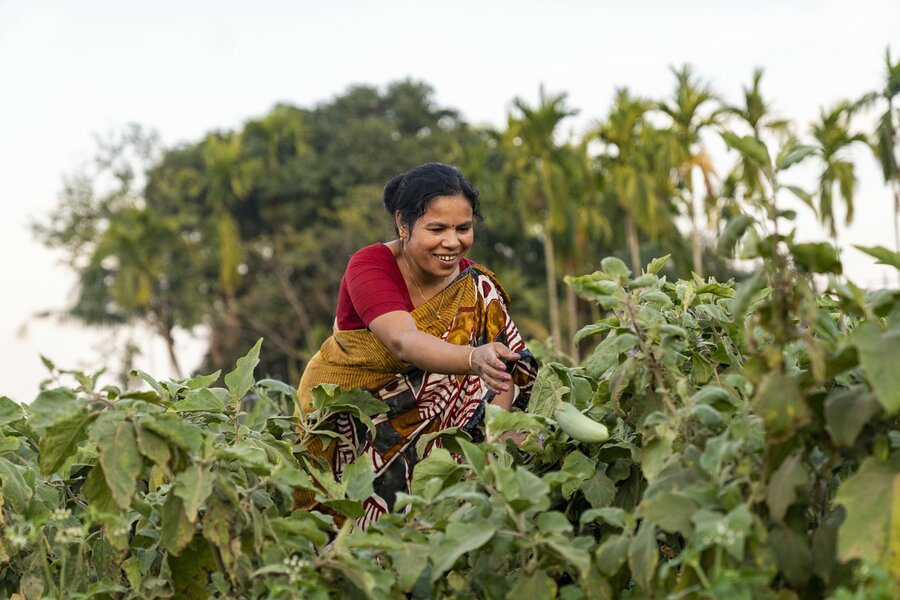
Photo credit : WFP
In Bangladesh, agriculture forms the cornerstone of the rural economy (80% of rural people dependent on agriculture) and is essential in fulfilling the daily dietary needs of its population. However, the safety of the vegetables, which are integral to the Bangladeshi diet, has emerged as a highly critical public health concern. Almost all types’ vegetables are commonly treated with harmful chemicals and pesticides, posing significant health risks and compromising the integrity of the nation’s food supply chain.
The pervasive use of substances like formalin and other chemicals by vegetable producers and sellers to enhance the appearance of freshness in produce is increasingly alarming. This critical issue persists even though robust food safety laws, such as the Food Safety Act of 2013, were established in response to national outrage over widespread food adulteration. These laws aimed to lessen risks by creating facilities like the laboratory formed in February 2015, which was intended to offer consumers, producers and sellers protection from toxins in food. Moreover, innovations such as “Carbon Green,” a pesticide-removing powder developed by Life and Health Limited in collaboration with Bangkok Hospital Office Bangladesh, have been suggested by doctors and experts like Dr. Sen to fight against contamination.
The impurity in vegetables and other food stems from environmental factors, as highlighted by Prof. ABM Faroque, former director of the Biomedical Research Centre at the Faculty of Pharmacy, Dhaka University. He noted that heavy metals like lead might enter the food chain through contaminated water consumed by livestock or through the use of low-grade fertilizers laden with impure elements. The excessive application of pesticides complexes this issue, as fruits and vegetables absorb a portion of these chemicals.
The efficacy of regulatory measures is undermined by a paucity of compliance from traders and inadequate enforcement by regulatory bodies, reflecting a broader disregard for public health. DCC Magistrate Khalil Ahmed has pointed out the deficiencies in enforcement capabilities, noting that inspectors are incapable to detect chemicals beyond formalin owing to a lack of required equipment. He advocates for the appointment of more skilled and experienced individuals like magistrates and health inspectors and calls for the modernization of laboratories to enhance food safety enforcement.
In order to tackle the critical issue of food safety in Bangladesh, particularly within its vegetable markets, the government may adopt a variety of successful international policies (been successful in many countries). For example, following the European Union’s approach, Bangladesh may establish strict maximum residue levels (MRLs) for pesticides in vegetables, coupled with regular monitoring and testing to make sure compliance.
Similarly, inspired by Japan (an Asian developed country), Bangladesh could develop a comprehensive traceability method that records the use of pesticides and fertilizers, thereby helping outright consumers make informed choices. Canada’s model of running public awareness campaigns about food safety might be replicated thoroughly to educate the Bangladeshi people from all walks of life on the dangers of chemical residues. Plus, adopting practices from the U.S.A., Bangladesh may modernize and expand its food safety laboratories to enhance testing capabilities. The Dutch system of supporting sustainable agriculture may guide the country—Bangladesh— in offering training and financial incentives to farmers for adopting integrated pest management and other sustainable practices. South Korea’s rigorous enforcement of food safety standards through a well-staffed inspection system may be taken to ensure compliance at all levels of food production and distribution in Bangladesh. Lastly, following Australia’s instance, implementing mandatory clear labeling on vegetable products can empower buyers with information about pesticide and fertilizer use, augmenting consumer rights and safety. By integrating these proven strategies and policies, Bangladesh can highly improve the safety and integrity of its vegetable markets, thereby safeguarding public health and bolstering the country’s agricultural economy.
Implementing comprehensive food safety policies in Bangladesh’s vegetable markets may presents numerous unavoidable challenges, including dearth of infrastructure and resources, inadequate training for farmers and vendors, confrontation from stakeholders due to potential cost increases and disruption of traditional practices, and complications in regulatory enforcement due to unsatisfactory manpower and possible corruption. Solutions include prioritizing investments in infrastructure development with possible international support (financial and technological supports), conducting widespread training programs through partnerships with agricultural experts, researchers, scientists, agriculture Universities and local-international NGOs, engaging stakeholders in the policymaking process to highlight long-term benefits, strengthening regulatory bodies by increasing the number of inspectors and executing stringent penalties for non-compliance, and providing some financial supports such as subsidies and government-backed loans/grants to aid small-scale farmers. Additionally, launching some public awareness campaigns to educate customers about the core benefits of safe produce, establishing pilot programs to test policies before extensive implementation, leveraging technology (available on this planet) for better traceability and training, and continuously monitoring, nursing and evaluating the policies’ effectiveness can collectively address, at least to mitigate the severity, these challenges and promote safer food practices in Bangladesh.
